Tense and voice_2
2 tense-voice
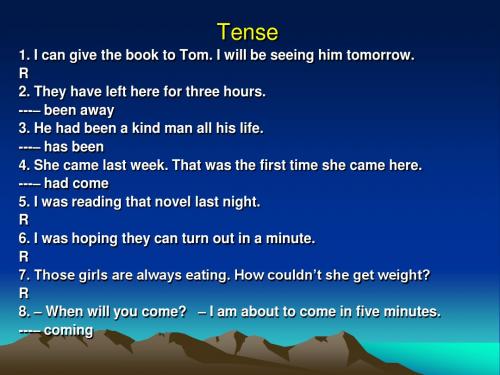
EX. Decide whether the followings are correct:
1. It’s impossible for lost time to made up. be made up 2. I don’t mind him being invited. ㊣ 3. The storm was survived by the man. The man survived the storm.
5. special points: We must pay special attention to what he says. says. Special attention must be paid to what he says. What he says must be paid special attention to. * Special attention to what he says must be paid.
4. We have got a lot of cases to be investigated. Let’s hurry. to investigate 5. Not having informed of the latest news, he felt angry. Not having been 6. I am tired of speaking to in such a way. being spoken
8. After she had returned home and began to prepare supper, the American girl remembered her invitation to have dinner at her friend’s home. begun (had begun)
Tense and voice时态语态练习
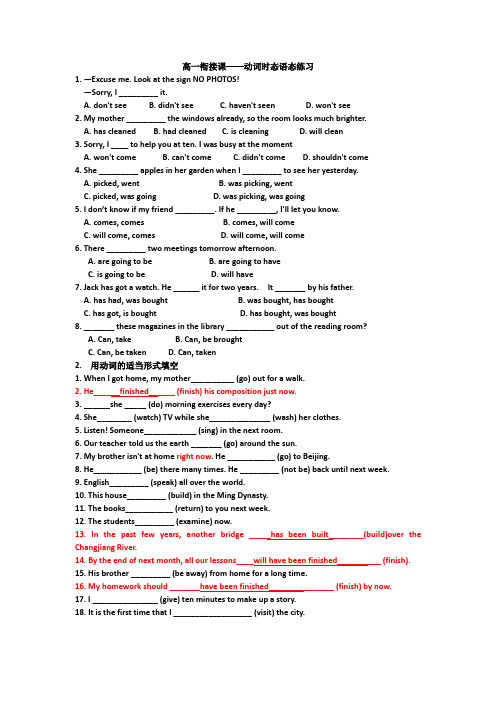
高一衔接课——动词时态语态练习1. —Excuse me. Look at the sign NO PHOTOS!—Sorry, I _________ it.A. don't seeB. didn't seeC. haven't seenD. won't see2. My mother _________ the windows already, so the room looks much brighter.A. has cleanedB. had cleanedC. is cleaningD. will clean3. Sorry, I ____ to help you at ten. I was busy at the momentA. won't comeB. can't comeC. didn't comeD. shouldn't come4. She _________ apples in her garden when I _________ to see her yesterday.A. picked, wentB. was picking, wentC. picked, was goingD. was picking, was going5. I don’t know if my friend _________. If he _________, I'll let you know.A. comes, comesB. comes, will comeC. will come, comesD. will come, will come6. There _________ two meetings tomorrow afternoon.A. are going to beB. are going to haveC. is going to beD. will have7. Jack has got a watch. He ______ it for two years. It _______ by his father.A. has had, was boughtB. was bought, has boughtC. has got, is boughtD. has bought, was bought8. _______ these magazines in the library ___________ out of the reading room?A. Can, takeB. Can, be broughtC. Can, be takenD. Can, taken2. 用动词的适当形式填空1. When I got home, my mother__________ (go) out for a walk.2. He______finished______ (finish) his composition just now.3. ______she _____ (do) morning exercises every day?4. She________ (watch) TV while she______________ (wash) her clothes.5. Listen! Someone____________ (sing) in the next room.6. Our teacher told us the earth _______ (go) around the sun.7. My brother isn't at home right now. He ___________ (go) to Beijing.8. He___________ (be) there many times. He _________ (not be) back until next week.9. English_________ (speak) all over the world.10. This house_________ (build) in the Ming Dynasty.11. The books___________ (return) to you next week.12. The students_________ (examine) now.13. In the past few years, another bridge _____has been built________(build)over the Changjiang River.14. By the end of next month, all our lessons____will have been finished__________ (finish).15. His brother _________ (be away) from home for a long time.16. My homework should _______have been finished_______________ (finish) by now.17. I _______________ (give) ten minutes to make up a story.18. It is the first time that I __________________ (visit) the city.Key: BACBC AAC。
高考英语writing-skills
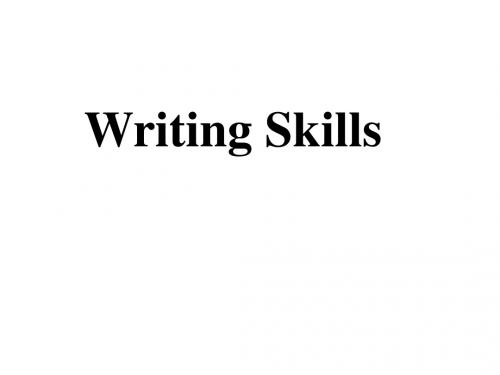
•tense and voice (时态和语态)
the present tense, Nhomakorabeahe past tense, the present future tense, active or passive voice
•person (人称) the first person 第一人称 •style (文章题材) 应用文 •the important points (list them out or underline them to make sure you won’t leave out one)(要 点要全)
A good composition should be:
well-connected
clear
economical: Use fewest words to
say the most;
tight:
Don’t use masses of “ands”, “buts”, “ors”, etc.
graceful: Be pleasant to read.
Let’s make it logical.
The Science Palace is not far from your hotel, First , and __________, therefore you may walk there. ______ when you go out of the hotel, turn left. Second _______,walk straight down the street until you come to a crossroads. Take a right turn there. ______ Third keep on walking till you see another crossroads. ________, Finally on the left you will see a post office at the corner of the street, and the Science Palace is next to it. You won’t _______ miss it.
tense&voice

过去将来时
be about to do sth… when be on the point of doing … when… 正要做……这时…… 我正要离开,这时电话响了。 I was about to leave when the telephone rang. 她正要离开,我就到了。 She was on the point of leaving when I arrived.
一般过去
过去进行 过去完成
一般将来
过去将来
next…, tomorrow, in…
多用在间接引语中表示发生在谓语动作以后 的动作
Grammar Revision
被动语态
1. 要求参观者自己带水和食物。 The visitors are required to bring the food and water by themselves. 强调或突出动作的承受者 to 2. 改错: Your pronunciation should be paid attention .
4.如果你请他, 他会来的。 He will come if you invite him. (主将从现:条件或时间状语从句中)
一般过去时
5.我们小时候常在一起玩。 We often played together when we were children. (过去经常的习惯性的动作) 6. 三天前我买了辆新车。 I bought a new car three days ago. (过去完成的动作或状态)
主动表被动
1. 这正是一个值得游览的地方。 It is the very place that is worth visiting. need, want, require 2. 这间房子需要重新粉刷。 The house needs painting/ to be painted again. 3. 这本书好卖。 描述物质属性的动词 The book sells well. 4. 英语很难学。 English is hard to learn. 不定式的逻辑主语是 句子的主语或以for sb. 形式出现
高中二年级下学期英语《过去完成时二》教学设计

Ask the studentsto complete the conversations with the correct forms of the words in the box usingthe past perfectpassive voice.
to complete the conversations with the correct forms of the words.
to complete the sentences with the correct forms of the given words.
Use what students have learnt in the previous activity about the past perfect tense to complete conversations.
Use what students have learnt in the previous activities about the past perfect tense in their own conversations.
板书设计
...the insects had all escaped.
... the insects had scattered everywhere in the room.
Learn how to analyse the meaning and use of the past perfect tense
Step 2பைடு நூலகம்
Ask the students to complete the sentences with the correct forms of the given words.
英语写作基础教程(effective Sentences 1)

Do not use different forms to express parallel ideas. E.g. Do not make unnecessary shifts in person and number, and the voice, tense or mood of verbs. E.g.
(Unity does not mean a writer can write only simple sentences.)
A long sentence expresses ideas that are closely connected. They are either ① A central idea supported or modified by various subordinate ideas, or ② Two or more related parallel ideas. e.g. The explorer who has just returned from the Antarctic is busy
Go on to p13 (after break)
Textbook: Instructor:
Class:
Size:
Classroom: Time:
Effective Sentences
Aim: Qualities of an effective sentence and ways to achieve effectiveness. Correctness alone cannot make a good sentence because it may not express the idea it intends to express very clearly or forcefully. It has to be effective at the same time.
新视野大学英语第三版读写教程第二册Unit7课文及翻译
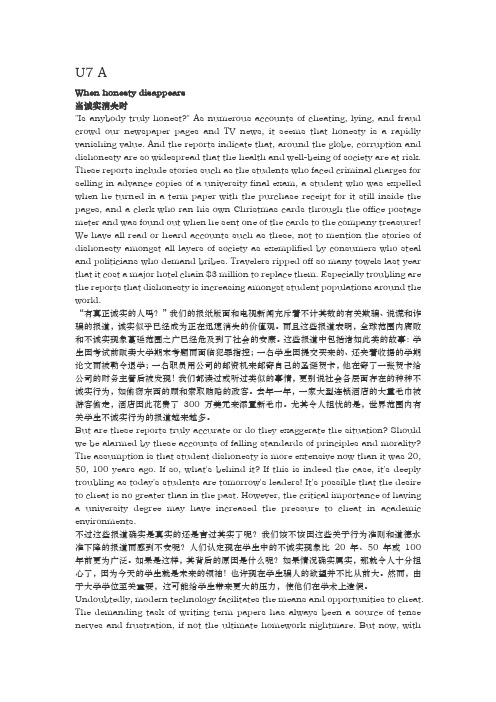
U7 AWhen honesty disappears当诚实消失时"Is anybody truly honest?" As numerous accounts of cheating, lying, and fraud crowd our newspaper pages and TV news, it seems that honesty is a rapidly vanishing value. And the reports indicate that, around the globe, corruption and dishonesty are so widespread that the health and well-being of society are at risk. These reports include stories such as the students who faced criminal charges for selling in advance copies of a university final exam, a student who was expelled when he turned in a term paper with the purchase receipt for it still inside the pages, and a clerk who ran his own Christmas cards through the office postage meter and was found out when he sent one of the cards to the company treasurer! We have all read or heard accounts such as these, not to mention the stories of dishonesty amongst all layers of society as exemplified by consumers who steal and politicians who demand bribes. Travelers ripped off so many towels last year that it cost a major hotel chain $3 million to replace them. Especially troubling are the reports that dishonesty is increasing amongst student populations around the world.“有真正诚实的人吗?”我们的报纸版面和电视新闻充斥着不计其数的有关欺骗、说谎和诈骗的报道,诚实似乎已经成为正在迅速消失的价值观。
Tense And Voice

Tense and Voice1.Present tense一般现在时常用时间副词:always, often, frequently, usually, sometimes, every day, once a year, seldom, rarely etc.1)表示重复发生的习惯性动作和真理当名词性从句表达一种真理或既成事实,动词是现在时Newton discovered that gravitation causes the objects to fall. (cause)Water boils at 100℃.(boil)2)在倒装句中,表示即将发生的动作用现在时代替进行时Here comes the bus. (come)There goes the bell. (go)3)主动表被动句中wash, sell, read, say, feel, write, sell, drive, cook, cut, iron,clean etc.This kind of book sells well. (sell)This kind of book has been sold out. (sell)The door won’t open. (not open)4)主将从现(条件,时间状语从句)If we works(work) hard, we will be(be) able to complete the work ahead of time.When he comes(come), I will tell him what has happened to his wife.It won’t (not be) a long time before the meeting begins.5)Make sure/certain that, see to it that, be sure that等宾语从句中,用一般现在时表将来Make sure all the windows are closed(close) before you leave.Be sure you finish (finish) it today.2.Present Continuous Tense现在进行时1)表示现在(指说话人说话时)正在发生的事情,有具体的时间状语Look! Atthat time etc.Listen! She is playing(play) the piano in the next room.2)表示按计划要进行的动作,用现在进行时代替将来时,如:go, come, start, move, leave, arrive等We are leaving this Friday. (leave)She is coming home this Tuesday. (come)The bus is coming. (come) cf. Here comes the bus. (come)3)表示渐变,get, grow, become, turn, run, go, begin, die等The leaves are turning red.It’s getting warmer and warmer.He’s dying.4)与always, constantly, forever等词连用,往往带有说话人的主观色彩,一般为抱怨He is always complaining about the food in his school. (always complain)The girl is always talking loud in public. (always talk)5) 下面四类动词不宜..用现在进行时。
杭州八年级上英语试卷【含答案】

杭州八年级上英语试卷【含答案】专业课原理概述部分一、选择题(每题1分,共5分)1. Which word is the correct form of the past tense of "go"?A. wentB. goedC. goneD. wented2. Choose the correct answer to plete the sentence: "If I _______ you, I would study harder."A. amB. wereC. beD. have been3. What is the plural form of "child"?A. childsB. childesC. childrenD. childs'4. Which word means "not correct"?A. wrongB. rightC. correctD. true5. What is the opposite of "expensive"?A. cheapB. costlyC. dearD. pricey二、判断题(每题1分,共5分)1. "Run" is the past tense of "running". ( )2. "He don't like apples" is a correct sentence. ( )3. "She has much books" is grammatically correct. ( )4. "They are going to buy a new car" indicates a future action. ( )5. "I didn't do nothing" means the same as "I did something". ( )三、填空题(每题1分,共5分)1. The opposite of "hot" is _______.2. If "cat" is singular, then its plural form is _______.3. The past tense of "eat" is _______.4. "I _______ to the library yesterday" (go)5. She _______ (be) a teacher.四、简答题(每题2分,共10分)1. What is the difference between "I did" and "I have done"?2. Expln the use of "will" in a sentence.3. What is a conjunction and give an example.4. How do you form the parative and superlative forms of adjectives?5. What is the difference between "affect" and "effect"?五、应用题(每题2分,共10分)1. Correct the mistakes in the following sentence: "She didn't went to the party because she's feeling sick."2. Change the following sentence to the passive voice: "The teacher is teaching the students."3. Rewrite the following sentence using "eitheror": "You can go to the park or you can stay at home."4. Use "used to" in a sentence to express a past habit.5. Form a question using the word "where": "You/ go/ yesterday?"六、分析题(每题5分,共10分)1. Analyze the sentence: "If it rns tomorrow, we will stay indoors." What tense is used and why?2. Expln the difference between "bring" and "take" with examples.七、实践操作题(每题5分,共10分)1. Write a short dialogue between two people discussing their plans for the weekend.2. Describe your favorite place in your city, using at least five adjectives and three adverbs.八、专业设计题(每题2分,共10分)1. Design a poster promoting a school recycling program, including key visuals and slogans.2. Create a storyboard for a short animated film about the water cycle.3. Draft a layout for a school library, considering the placement of bookshelves, reading areas, and puter stations.4. Design a logo for a fictional school sports team, incorporating the school colors and a mascot.5. Plan a school garden, including the selection of plants and arrangement of paths and seating areas.九、概念解释题(每题2分,共10分)1. Expln the concept of a passive voice in English grammar.2. Define the term "alliteration" and provide an example.3. Describe what a "simile" is in literature.4. Expln the difference between "metaphor" and "personification".5. Define "onomatopoeia" and give two examples.十、思考题(每题2分,共10分)1. Reflect on the importance of learning a second language. How does it benefit individuals and society?2. Consider the role of technology in education. How has it changed the way students learn?3. Think about the impact of environmental issues on future generations. What can students do to make a difference?4. Discuss the value of cultural exchange programs in schools. How do they contribute to global understanding?5. Reflect on the significance of art and music in the school curriculum. How do these subjects enrich a student's education?十一、社会扩展题(每题3分,共15分)1. Research a famous historical figure from your city or region. Describe their contributions and how they are remembered today.2. Investigate a local environmental issue, such as pollution or habitat destruction. Propose solutions and actions that could be taken to address the problem.3. Explore the cultural heritage of your city or region. Describe a festival, tradition, or artifact that represents this heritage.4. Interview a munity leader or public figure about their views on education. Summarize their insights and how they align with your own experiences.5. Examine a current event or issue in the news that affects young people. Discuss its relevance to students and potential implications for the future.本专业课原理概述部分试卷答案及知识点总结如下一、选择题答案1. A2. B3. C4. A5. A二、判断题答案1. ×2. ×3. ×4. √5. ×三、填空题答案1. cold2. cats3. ate4. went5. is四、简答题答案1. "I did" refers to a pleted action in the past, while "I have done" refers to an action that was pleted at an unspecified time before now.2. "Will" is used to express future actions, promises, offers, predictions, and spontaneous decisions.3. A conjunction is a word that connects clauses or sentences. Example: "and", "but", "so".4. Comparative: add -er to adjectives (e.g., tall taller) or use "more" (e.g., happy happier). Superlative: add -est to adjectives (e.g., tall tallest) or use "most"(e.g., happy happiest).5. "Affect" is usually a verb meaning to influence, while "effect" is usually a noun meaning the result or oute.五、应用题答案1. She didn't go to the party because she was feeling sick.2. The students are taught the teacher.3. You can either go to the park or stay at home.4. I used to walk to school when I was younger.5. Where did you go yesterday?六、分析题答案1. The sentence uses the conditional tense to express a condition (if it rns) and the future tense to express the result (we will stay indoors).2. "Bring" means to carry something towards the speaker, while "take" means to carry something away from the speaker. Example of "bring": "Please bring me the book." Example of "take": "I will take the book to the library."七、实践操作题答案1. Dialogue:Person A: "What are you doing this weekend?"Person B: "I'm going to visit my grandparents in the countryside. How about you?"Person A: "I'm staying in the city. I have a basketball game on Saturday and I need to study for a test on Monday."2. Description:My favorite place in the city is the central park. It is a large, green oasis in the middle of the bustling city. The park is beautifully mntned with lush grass, colorful flowers, and tall, majestic trees. There are winding paths that are perfect for jogging or leisurely walks. The park is also home to a small lake with ducks and swans, where children can feed the birds. In the summer, there are often outdoor concerts and festivals, making it a vibrant and lively place. The park is a peaceful escape from the hustle and bustle of city life, and I always feel relaxed and rejuvenated after spending time there.知识点总结及各题型考察知识点详解:一、选择题:主要考察学生对英语基础词汇和语法的掌握,包括动词时态、名词复数、形容词比较级和最高级等。
Tense and Voice动词的时态与语态

考点一: 考点一:used to + do,表示过去经常但现在已不再维 , 持的习惯动作。 为不定式 后接动词原形。 为不定式, 持的习惯动作。to为不定式,后接动词原形。 be/become/get used to + doing,表示习惯于 , He used to smoke a lot. He has got used to getting up early. 考点二:在时间和条件状语从句中,代替过去将来时。 考点二:在时间和条件状语从句中,代替过去将来时。 He promised to buy me a computer if he got a raise 考点三:表示过去经常发生或反复发生的动作, 考点三:表示过去经常发生或反复发生的动作,可和 ofen, always, once a month/week, for 等时间状语连用。 等时间状语连用。 例:He worked in that bank for four years. He always went to work by bike.
4.过去进行时 过去进行时 现在分词构成) (was/were+现在分词构成) 现在分词构成
过去某个时刻正在发生的动作, 过去某个时刻正在发生的动作, 也可表示过 去某段时间内正在发生或反复发生的动作, 去某段时间内正在发生或反复发生的动作,时 间状语有: 间状语有:at that time, then, the whole morning,at five yesterday,this time yesterday,last night. Yesterday afternoon I was watching TV when Frank called. Bill was coughing all night long.
高二英语人教版 选择性必修四 Unit 1 Learning About Language
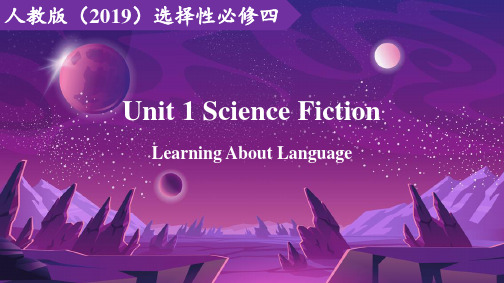
3. Rumours are like sharp knives, cutting one’s self-respect into pieces. We should be aware dignity
人教版(2019)选择性必修四
Unit 1 Science Fiction
Learning About Language
Build up your vocabulary
Learning objectives
By the end of this section, you will be able to:
Use words we have learned to answer the following questions. ➢ Why did Claire begin to trust Tony? What do you think is the most
important factor that helps us to earn people’s trust? ➢ Why do you think though it was completely innocent, Claire still felt guilty
performance ( 1 ) money received from work, investments and so on ( 2 ) money paid to a professional person or organisation for advice or services ( 3 ) money paid for a journey on public transport, such as the bus, train, or taxi ( 7 ) money saved for a special purpose
Unit 7 Past Future Tense

1. --The plane is leaving right now, but Jim hasn't arrived yet. 3. Fill in the blanks with proper verb forms. -- Well, he said he would come(come) here on time.
story, using Past Perfect. (演示修改后的故事、师生点评) (交叉检查修改)
1. correct the story
A new house
I had a letter from my sister yesterday. She lives in Nigeria. In her letter, she said that she should come to England the next year.
表示从过去的某一时间 Q3:What Tenses? expression ? Four forms of Q1: When / how? Q2: 看来将来要发生的动作
或存在的状态。
The secretary told me that Mr. Harmsworth would see me. I felt very nervous when I went into his office. He did not look up from his desk when I entered. Past Future After I had sat down, he said that business was very bad. Would / should + do 常用于宾语从句(即间接引语)中; He told me that the firm could not afford to pay such Was/ were going to do 表示过去习惯性的动作。此时,不 large salaries. Twenty people had already left. I knew Was/ were + to do 管什么人称,一律用would。 that my turn had come. Was/ were doing “Mr. Harmsworth,” I said in a weak voice. “Don't interrupt,” he said. Then he smiled and told me I would receive an extra thousand pounds a year!
全新版大学英语(第二版)综合教程2unit5

Unit 5 A True HeightLecture Notes (for students)Words and Expressionsmere: adj. nothing more than; only(She lost the election by a mere 20 votes.)光说无济于事。
(Mere words won’t help.)passion: n. strong feeling, esp. of love(The poet expressed his burning passion for the woman he loved.)他特别喜欢吃冰淇淋。
(He has a passion for ice cream.)Coincide (with): v.1) (of ideas, opinions, etc.) to be in agreement 与…一致His tastes and habits coincide with those of his wife.The judges did not coincide in opinion.2) happen at the same timeThe art exhibition coincides with the 50th anniversary of his death.alternate:1.adj. 1) every other or secondHe works on alternate days.2) (or two things) happening by turns这是晴雨交替的一周。
(This is a week of alternate rain and sunshine.)2.v. (cause to ) follow by turns汤姆时而发怒,时而害怕。
(Tom alternated between anger and fright.) Collocation:alternate between 时而…时而…*They alternate between supporting us and opposing us.11111alternate in 轮流*We alternate in doing the household chores.alternate with (使)与…交替*Sunny weather alternates with rain.vain: adj.1) too pleased with one’s own abilities or looksShe’s vain of her beauty.他极其自负。
2022高考外研版英语训练1主要国家地理概况含解析
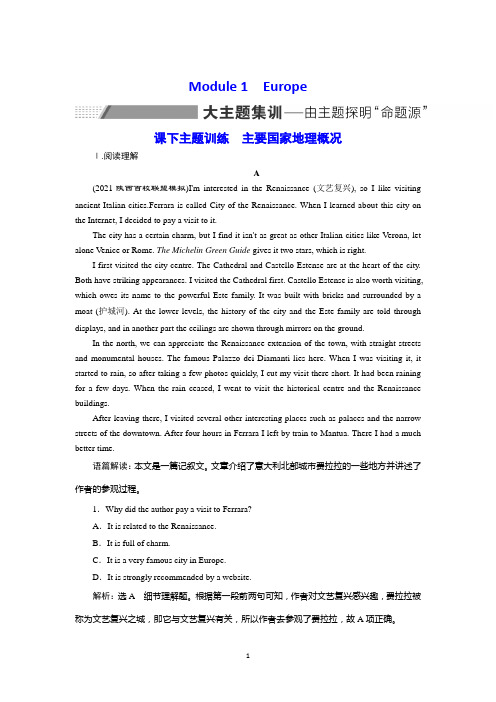
Module 1 Europe课下主题训练主要国家地理概况Ⅰ.阅读理解A(2021·陕西百校联盟模拟)I'm interested in the Renaissance (文艺复兴), so I like visiting ancient Italian cities.Ferrara is called City of the Renaissance. When I learned about this city on the Internet, I decided to pay a visit to it.The city has a certain charm, but I find it isn't as great as other Italian cities like Verona, let alone Venice or Rome. The Michelin Green Guide gives it two stars, which is right.I first visited the city centre. The Cathedral and Castello Estense are at the heart of the city. Both have striking appearances. I visited the Cathedral first. Castello Estense is also worth visiting, which owes its name to the powerful Este family. It was built with bricks and surrounded by a moat (护城河). At the lower levels, the history of the city and the Este family are told through displays, and in another part the ceilings are shown through mirrors on the ground.In the north, we can appreciate the Renaissance extension of the town, with straight streets and monumental houses. The famous Palazzo dei Diamanti lies here. When I was visiting it, it started to rain, so after taking a few photos quickly, I cut my visit there short. It had been raining for a few days. When the rain ceased, I went to visit the historical centre and the Renaissance buildings.After leaving there, I visited several other interesting places such as palaces and the narrow streets of the downtown. After four hours in Ferrara I left by train to Mantua. There I had a much better time.语篇解读:本文是一篇记叙文。
高中英语新课标外研版必修4教案Period3Function;Grammar1,2(Module4G
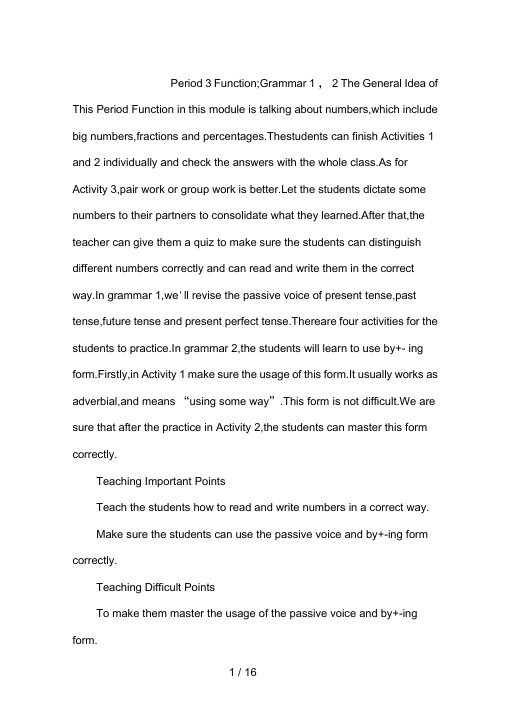
Period 3 Function;Grammar 1 ,2 The General Idea of This Period Function in this module is talking about numbers,which include big numbers,fractions and percentages.Thestudents can finish Activities 1 and 2 individually and check the answers with the whole class.As for Activity 3,pair work or group work is better.Let the students dictate some numbers to their partners to consolidate what they learned.After that,the teacher can give them a quiz to make sure the students can distinguish different numbers correctly and can read and write them in the correct way.In grammar 1,we'll revise the passive voice of present tense,past tense,future tense and present perfect tense.Thereare four activities for the students to practice.In grammar 2,the students will learn to use by+- ing form.Firstly,in Activity 1 make sure the usage of this form.It usually works as adverbial,and means “using some way”.This form is not difficult.We are sure that after the practice in Activity 2,the students can master this form correctly.Teaching Important PointsTeach the students how to read and write numbers in a correct way.Make sure the students can use the passive voice and by+-ing form correctly.Teaching Difficult PointsTo make them master the usage of the passive voice and by+-ing form.Teaching MethodsIndividual work and pair work to make every student work in class.Teaching AidsMultimedia & a blackboardThree Dimensional Teaching AimsKnowledge and SkillsMake the students learn to use the mathematical terms in a correct way.Make sure the students can use the passive voice in different tenses and by+-ing form correctly.Process and StrategiesMotivate the students'enthusiasm in taking part in the class.Feelings and ValueThrough the study of this period the students will surely know more about the basic use of the passive voice and by+-ing form and how to read and write different numbers correctly.Teaching ProceduresStep 1 Revision(Greetings as usual>T:First,let's have a dictation of the new words and expressions we learnt last class.1. staple2.leading3.figure4.breeding5.species6.yield7.original8.sterile9.breakthrough 10.convert 11.export 12.hybrid 13.replace14.bring up 15.asa result ofStep 2 FunctionT:Function in this module is about numbers.Now,look at Activity 1 on Page 35.Choose the correct way of saying the numbers.1.5 000 000(a>five million ___________________ (b>five millions2.47.5%(a>forty seven half percent(b>forty seven point five percent3.632(a>six hundred and thirty two(b>six hundred thirty two4.4/5(a>four fifths ___________________ (b>four fiveAsk the students to complete them individually and then collect the answers in the whole class.After that,give the students several minutes to read them aloud.Suggested answers:1. a2.b3.a4.aT:Now let's come to Activity 2.Read the sentences aloud and attentively.1. Rice was first grown about 5000 years ago.2. China exports about 1.5% of its rice.3. Australia produces about 250 000 tons of rice.4.2/3 the world's population regularly eat rice.T:OK,class.Now are you sure you can say the numberscorrectly?Dictate some numbers to your partner,including bignumbers,fractions and percentages.Then I will give you a quiz.(After the students practice with each other,the teacher gives them the followingquiz.Read the mathematical terms correctly.>(Show the numbers on the screen or on the blackboard.>1.10352.3/73.46%4.2 840 0005.$95.5Ask the individual to read them,one number a student.After the students complete them,let them read numbers together.Suggested answers:1.one thousand and thirty five2.three sevens3.forty six percent4. two million eight hundred and forty thousand5.ninety five point five percentStep 3 Grammar 1:The Passive VoiceT:Now let 's come to revision of the passive voice.First please study the sentences in Activity 1 on Page 33.(Show the following sentences on the screen.>a. Rice is grown in many other Asian countries.b. Researchers were brought in from all over China.c. The research was supported by the government.d. In Pakistan rice will be grown in many parts of the country.e. The new hybrid rice has been developed by the Yuan Longping High- tech Agriculture Company of China.T:Now answer the following questions.(Show them on the screen.>1. Which sentence is in the present simple(passive voice>?2. Which sentences are in the past simple(passive voice>?3. Which sentence refers to the future?4. Which sentence is in the present perfect?5. Which sentences are easy to transform into the active voice?Why?Ask the students to complete them in pairs,then call back their answers from the whole class,having one student ask the question and another read the example sentence.Suggested answers:1. a2.b and c3.d4.e5.c and e,because you can easily find the subject of the active voice after“by”.T:From the sentences above,we can know the structure of the passive voice:be+done.Tenses are observed through th“ebe”verb.So the structure of the passive voice in the present,the past,the future,and the present perfect forms are as follows:am/is/are+p.p.(the present simple>;was/were+p.p.(the past simple>;will be+p.p.(the future simple>;and have/has been+p.p.(the present perfect form>.Now please make the sentencesin Activity 2 using the correct tense of the passive voice.Example:These shoes/make/in ItalyThese shoes are made in Italy.1. These computers/produce/in America2. Rice/grow/in China/for/thousands of years3. These electronic games/make/in Japan4. A new variety of rice/discover/in 19705. Many important discoveries/make/since/the beginning of last centuryAsk the students to complete their answers individually,then check with a partner.Ask some of them to report their answers.Suggested answers:1. These computers are produced in America.2. Rice has been grown in China for thousands of years.3. These electronic games are made in Japan.(could also be “were made”>4. A new variety of rice was discovered in 1970.5. Many important discoveries have been made since the beginning of last century.After the students finish sentences,ask the whole class to answer the additional activity:what form of the passive voice are the sentences?Suggested answers:1. present simple2.present perfect3.present simple(past simple>4.past simple5.present perfectT:Now class,I think you have mastered the use of the passive voice.Let's do another two activities to consolidate what we've learned.First,complete the sentences using the verbs in brackets in Activity 3.Ask the students to fill in the blanks individually,then the teacher let some volunteers speak out their answers.During class,the teacher should encourage the students to be active in class,and give the students more chances.(Show the following sentences on the screen.>1. ___________________ As a boy he (educate>in many schools.2. _____________ He (give>the nickname,”the student who asks questions”.3. __________________________________ The results of his experiments _____________________________ (publish>in China in 1966.4. ___ Finally,in 1970 a naturally sterile make rice plant (discover>.5.50 thousand square kilometers of rice fields (convert>to growing vegetables.6. _________________________________________ Following this,Yuan Longping 's rice _____________________________ (export>to other countries.Suggested answers:1. was educated2.was given3.were published4.was discovered5.were converted6.was exportedT:Just now,you've got the whole sentences correctly.Now let's do a further job.Write questions based on the information in Activity 3.The first word in the sentence is given.We'll have a pair work this time.Discuss the sentence with your partner,then gives us the questions.One gives us the question,while his or her partner gives us the answer.(Show the following on the screen.>1. Where ?2. What ?3. When ?4. When ?5. How many ?6. Where ?Suggested answers:Questions:1. Where was he educated(as a boy>?2. What nickname was he given?3. When were the results of his experiments published(in China>?4. When was a naturally sterile male rice plant finally discovered?5. How many square kilometers of rice fields were converted to growing vegetables?6. Where was Yuan Longping's rice exported?Answers:1.As a boy he was educated in many schools.2. He was given the nickname”,the student who asks question”s.3. The results of his experiments were published in China in 1966.4. Finally,in 1970 a naturally sterile make rice plant was discovered.5.50 thousand square kilometers of rice fields were converted to growing vegetables.6. Following this,Yuan Longping 's rice was exported to other countries.Step 4 Grammar 2T:Here is a sentence for you to decide which question the underlined phrase answers.(Show the sentence on the screen.>He thought he could produce more rice by crossing different species of plant.1.What could he produce?2. Why should he produce more rice?3. How could he produce more rice?T:OK,class.Which one is the correct answers?Ss:No.3.T:That's right.This question is easy to understand.From the question,we know grammar in this part is by+-ing form.It usually works as adverbial,and means “using some way”.This form is not difficult.We are sure that after the practice in Activity 2,you can master this form correctly.Now,let's come to Activity 2.Rewrite the sentences by changing 8/ 16the underlined phrases with a phrase beginning with by+-ing.(Read the example and have the students follow.Make sure they understand the form.Then ask the students to complete the activity in dividually,a nd call back the an swers from the whole class as complete sen ten ces,hav ingone stude nt read the orig inal and ano ther the altered versi on.>(Show the followi ng senten ces on the scree n.>Example: You can get a good job if you study hard.You can get a good job by study ing hard.1. Yuan Longping cha nged agricultural in Chin a.He discovered a new type of rice.2. Researchers learn things whe n they carry out experime nts.3. They changed the design and so they built a better engine.4. You will become a better pianist if you practise often.5」f you plan for the future we can be happy in the present.Suggested an swers:1. Yuan Longping changed agriculture in China by discovering a new type of rice.2. Researchers lear n things by carrying out experime nts.3. By cha nging the desig n they built a better engine.4. You will become a better pianist by practicing often.5. By pla nning for the future we can be happy in the prese nt.Step 5 Summary and homeworkT:Through this class we have learned the correct way of saying numbers.In the part of grammar,we learned the passive voice in the present simple,the past simple,the future simple and the present perfect tense,we studied the usage of by+-ing form as well.Homework today is to find more examples to practice after class.So much for today.Good- bye,everyone!T:Good-bye,teacher!The Design of the Writing on the BlackboardModule 4 Great ScientistsThe third period1.10352.3/73.46%4.2 840 0005.$95.5Record after TeachingActivities and Research1.Find more numbers to practice with your partners.2. Go over the passive voice in different tenses and by+-ing form...Reference for TeachingGrammar被动语态1.被动语态的构成英语动词有两种语态: 主动语态和被动语态。
2019自考英语二Unit_7B
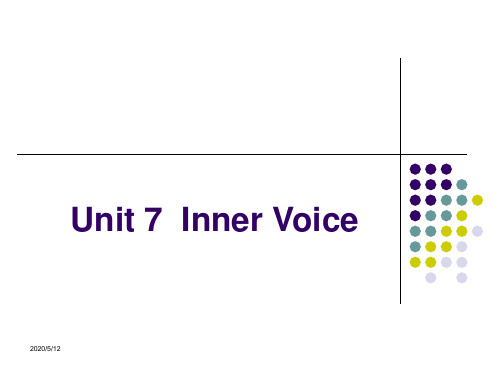
Text B Make a good first impression
At a dinner party in New York, one of the guests, a woman who had inherited money, was eager to make a pleasing impression on everyone. She had squandered a modest fortune on sables, diamonds and pearls.
veterinarian 兽医;tell of 讲述,讲到; incoculate 给…接种,打预防针;
Dr. Stephen K. Sproul, a veterinarian in Raytown, Missouri, told of a typical spring day when his waiting room was full of clients waiting to have their pets inoculated(给接种).
actions speak louder than words 行动胜于 言语; make a hit 受欢迎,给(某人)留下很好的第 一印象;
Actions speak louder than words, and a smile says, "I like you. You make me happy. I am glad to see you." That is why dogs make such a hit(受欢迎).
英语人教新目标九年级全一册Section A 3 10.27 下午

按要求写出下列单词或短语。
1. rule (名词) ___r_u_le_r____ 2. near (副词) __n__ea_r_l_y___ 3. nation (形容词) __n_a_ti_o_n_a_l_ 4. 偶然; 意外地 _b__y_a_c_c_id_e_n_t__ 5. 发生 __t_a_k_e_p_l_a_c_e___ 6. 毫无疑问; 的确 __w_i_th_o_u_t__d_o_u_b_t_ 7. 跌落 __fa_l_l_i_n_to__
pron. 某人 n. 重要人物
2. Somebody stole my camera from my hotel room. _M__y_c_a_m__e_ra__w_a_s__st_o_l_e_n_f_r_o_m__m__y_h_o_t_e_l _ _r_o_o_m_.____________________________
3. 它是由谁发明的? _W__h_o__ _w_a_s__ it invented __b_y___?
4. 是由惠特科姆•贾得森发明的。 It _w_a_s__ _i_n_v_e_n_t_ed__ _b_y_ Whitcomb Judson.
5. 茶叶什么时候被带到朝鲜的? _W__h_en__ _w_a_s_ tea __b_r_o_u_g_h_t_ to Korea?
II. 将下列句子改为被动句 1. The waiter took away the plates after we
finished eating. _Th_e_pl_at_es_w_er_e t_ak_e_n a_w_ay_b_y t_he_w_a_ite_r ________________ after we finished eating. 2. A middle school student invented a new robot last term. _A_ne_w_r_ob_ot_w_as_in_ve_n_te_d b_y_a _mi_dd_le________________ _sc_ho_o_l s_tu_de_nt__________ last term.
- 1、下载文档前请自行甄别文档内容的完整性,平台不提供额外的编辑、内容补充、找答案等附加服务。
- 2、"仅部分预览"的文档,不可在线预览部分如存在完整性等问题,可反馈申请退款(可完整预览的文档不适用该条件!)。
- 3、如文档侵犯您的权益,请联系客服反馈,我们会尽快为您处理(人工客服工作时间:9:00-18:30)。
• 6. 过去完成时 • 表示过去某个时间之前已经完成的动作, 即过去完成时的动作发生在“过去的过去”, 句中有明显的参照动作或时间状语,这种时态 从来不孤立使用 ( before, after, by, up till ) • There had been 25 parks in our city up till 2000. • By the end of last term we had finished the book. • They finished earlier than we had expected. • 考点一:用于hardly/scarcely...when; no sooner ...than 句型中,主句用过去完成 时,从句用一般过去时。 • I had hardly finished my work when he came to see me.
• 考点一:表示永恒的真理,即使出现在过去的语 境中,仍用一般现在时。如: • I learned that the earth goes around the sun when I was in primary school. • 考点二:在时间和条件状语从句中,代替一 般将来时;常用的引导词有: • 时间:when, until, after, before, as soon as, once, the moment/the minute, the day; 条件:if, unless, provided. • If he accepts the job, he will get more money soon. •
• 汉语的时态大多是通过副词来表达的,而英语的 时态是靠动词的变化和时间状语来表达的。英语 中的时态共有十六种,但是常考的或较常用的只 有9种,而且重点测试完成时态。 要掌握英语的 时态和语态,必须掌握好英语中的助动词(do, be, have)和时间状语这两个核心问题。 • 1、一般现在时 • 主要用来表示人、事物的现在状况和特点; 表示经常或习惯性的动作,句子中常有often, always, from time to time 等时间状语; 表示 客观规律和永恒真理等。 • He usually goes to work at 7 o’clock every morning. • She has a brother who lives in New York. • The earth goes around the sun. • Guangzhou is situated in the south of China.
• 考点二:常见的不确定的时间状语:lately; recently, just, already, yet, up to now; till now; so far, these days, • Has it stopped raining yet ? • 考点三:在表示“最近几世纪/ 年/ 月以来……” 时间状语中,谓语动词用现在完成时。 • in the past few years/months/weeks/days; over the past few years; during the last three months; for the last few centuries, through centuries; throughout history 等 • 考点四:表示“第几次做某事,”或在 “It is the best (worst, most interesting ) +名词 +that” 后面跟现在完成时。 • This is my first time that I have visited China. • This is the most interesting film I have ever seen. • That is the only book that he has written.
• 5. 过去进行时 • 表示过去某个时间点或某段时间内正在发 生的动作。 • The boy was doing his homework when his father came back from work. • He was taking a walk leisurely by the lake when he heard someone shouted for help. • What were you doing at nine last night? • The radio was being repaired when you ca作或状态的时间性则可分为如下三个 时段: • 1.现在(Present) • 2.过去(Past) • 3.将来(Future)
• 这四种词形形式和三个时段可以配合成 如下的十二种动词的时态。
• 这十二种时态可以列表如下:
• 现以“I”为主语,“do”为动词,把这十二种 时态以实例表达如下:(例序即为时态的次序) • 1.I do it every day. • (我每天做这样的事。) • 2.I did it yesterday. • (昨天我做了这件事。) • 3.I shall/will do it tomorrow. • (明天我要做这件事。) • 4.I am doing it now. • (现在我正在做这件事。) • 5.I was doing it at that time. • (当时我正在做这件事。)
• 2、现在进行时 • 表说话时或目前一段时间内正在进行的活动: 或表感情色彩,加强语气。与频率副词,如 always,constantly,continually,again等连用 表示说话人的某种感情色彩(赞叹、厌烦、埋怨 等)。 • We are having English class. • The house is being built these days. • The little boy is always making trouble. • 考点一:在时间状语或条件状语从句中表示 将来正在进行的动作。 • Look out when you are crossing the street. • Don't wake him up if he is still sleeping at 7 tomorrow morning.
• 11.I had been doing the work for two hours when the teacher came. • (老师来时那件工作我已做了两小时了。── 当时工作尚未完成,所以老师来了我还继续在 做。) • 12.I shall/will have been doing it for an hour when you come to see me at 9: 00 tomorrow morning. • (明天早上九时你来看我时,我会在做那件工 作做了一小时。──当然尚未能做完,还得继 续做下去。)
• •
•
• • • •
•
4.一般过去时 表在过去某个特定时间发生且完成的动作,或过 去习惯性动作,不强调对现在的影响,只说明过去。 常跟明确的过去时间连用,如:yesterday; last week; in 1945, at that time; once; during the war; before; a few days ago; when, 注意: 考点一:used to + do,表示过去经常但现在已 不再维持的习惯动作。to为不定式,后接动词原形。 be/become/get used to + doing,表示习惯于 He used to smoke a lot. He has got used to getting up early. 考点二:在时间和条件状语从句中,代替过去将 来时。 He promised to buy me a computer if he got a raise
Tense and voice
• 定义 动词以一定的词形变化形式来表达事 物之动作或状态的时间性者称为时态 (Tense)。 • 词形变化的形式共有如下四种: • 1.一般式(Simple Form) • 2.进行式(Progressive Form) • 3.完成式(Perfect Form) • 4.完成进行式(Perfect Progressive Form)
• • •
• •
考点三:在make sure (certain), see to it, mind, care, matter +宾语从句, 从句用一般现在时代替一般将来时。 So long as he works hard, I don’t mind when he finishes the experiment. 只要他努力工作, 我不介意他什么时候 做完试验。 考点四:在the more… the more … (越……越……) 句型中, 若主句是一般将来时, 从句通常用一般现在时。 The harder you study, the better results you will get.
• • • • • •
• • • •
• • • •
I had no sooner got into the room than it began to snow. No sooner had I arrived home than the telephone rang. (注意主谓倒装) 考点二:表示“第几次做某事”,主句用 过去时,从句用过去完成时。 That was the second time that she had seen her grandfather. It was 3 years since we had parted。 考点三:动词hope, expect, think, intend, mean, want, suppose, plan 用过去 完成时,表示未实现的愿望、打算和意图。 I had hoped that I could do the job. I had intended to see you but I was too busy.
